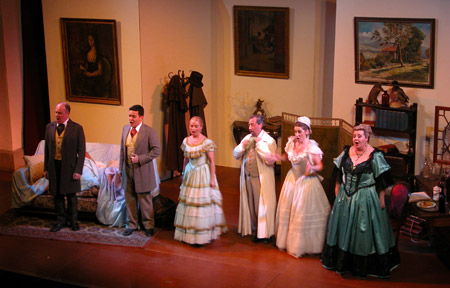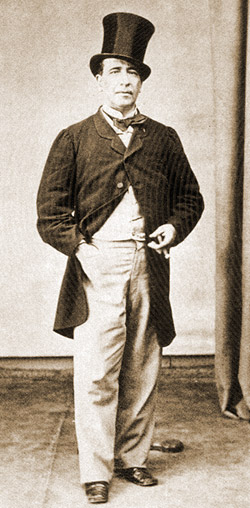 |
Buenas noches |
|
This material is © Christopher Webber, Blackheath, London, UK. Last updated September 12th 2007 |
|
Luis Olona, one of the founding fathers of the Teatro de la Zarzuela (1856), often worked from French originals. His talent for adapting them to Spanish settings and social conditions, in fluent dialogue, gives his writing a robust theatricality that still makes its effect. The miniature, vaudeville operetta Bonsoir, monsieur Pantalon (Paris 1851, by Lockroy and de Morvan, with a score by Albert Grisar) was itself drawn from a one-act English farce. It provided Olona with a tight and amusing plot onto which he grafted some typical figures from Spain’s burgeoning merchant class, plus a boldly painted pair of Galician dockers. Oudrid’s five musical numbers are more than incidental, articulating and defining the stage action rather than providing mere vocal punctuation marks. Two numbers are specially distinctive: the opening, off-stage tenor barcarolle which transforms seamlessly into a delicate, on-stage female trio; and the “buenas noches” ensemble itself, where the repetitions of Oudrid’s genial little refrain are aptly witty (and naggingly memorable!) His style is light without being trivial, direct without being banal, owing as much to the clean-cut French style of Auber or Adam as to Rossini or Donizetti, though with traces of a Spanish accent in the music for the rural artisans. |
|
Buenas noches señor Don Simón enjoyed complete success on its opening night at Teatro del Circo (16th April 1852), rapidly becoming one of the most performed of early zarzuelas throughout Spain. Though its popularity held for many years it sank out of sight around the turn of the century, not to be seen again until 2006 when Ópera Cómica de Madrid’s skilful production revealed it to be as lively and pleasant as ever. Nothing is new under the sun: Grisar’s French “original” – still likewise occasionally revived as a classic of its kind – is itself a close reworking of an 1835 English burletta by John Oxenford, called Twice Killed. The French vaudeville in turn spawned Julius Eichberg’s The Doctor of Alcantara (1879), one of the very first locally-written operettas to be staged in the USA, as well as Olona's Spanish zarzuela.
The chemist Don Procopio lives in Cadiz, with his wife Doña Inés and pretty young pupil Isabel. She is promised to Teodoro, the son of a Tarragona merchant, who has never met his fiancée or Don Procopio; but she has fallen in love with a nameless young man she met whilst at college in Barcelona.

![]() Scene
1. A room in Don Procopio’s Cadiz villa, with a balcony overlooking the
sea. A young man is heard serenading his lover from a boat passing
under the balcony, whilst the three ladies of the house – Doña
Inés, Isabel and the maid Juana – muse on the beauty of his voice,
and wonder at whom the song may be directed (No.1 – Barcarola:
“Huyó la luz del día”.) Don
Procopio, assisted by Juana and Isabel, is keen to get on with the day’s
scientific experiments, and sends his wife about her daily business; but before
they can start work a pair of muscular Galician dockers start lugging a
mysterious heavy box into the room and a humorous ensemble ensues as they
refuse to take it away, or move the wretched thing any further (No.2
– Quinteto: “Pues, eh, quedo enterado”.)
Juana explains that the box most probably contains a large cake baked for her
by her fiancé, a local pastry-cook, and ushers them out into Don
Procopio’s laboratory.
Scene
1. A room in Don Procopio’s Cadiz villa, with a balcony overlooking the
sea. A young man is heard serenading his lover from a boat passing
under the balcony, whilst the three ladies of the house – Doña
Inés, Isabel and the maid Juana – muse on the beauty of his voice,
and wonder at whom the song may be directed (No.1 – Barcarola:
“Huyó la luz del día”.) Don
Procopio, assisted by Juana and Isabel, is keen to get on with the day’s
scientific experiments, and sends his wife about her daily business; but before
they can start work a pair of muscular Galician dockers start lugging a
mysterious heavy box into the room and a humorous ensemble ensues as they
refuse to take it away, or move the wretched thing any further (No.2
– Quinteto: “Pues, eh, quedo enterado”.)
Juana explains that the box most probably contains a large cake baked for her
by her fiancé, a local pastry-cook, and ushers them out into Don
Procopio’s laboratory.
Doña Inés returns to see what all the noise has been about, and is surprised when the box pops open to reveal a decidedly handsome young man. Initially alarmed, she is soon excited and flattered by his feigned hints of amorous passion (No.3 – Arieta:“Benéfica y magnánima”), finally summoning up enough outraged virtue to tell him to get back into the crate, whilst she goes off to find the Galician workers to remove both him and it. Before she can return, the youth fills up the box with heavy scientific tomes and hides himself in an adjoining room, waiting for a chance to catch Isabel – the true object of his passion – alone.
Juana returns with Don Procopio to get at the cake, but before they can open it they hear Doña Inés making her way back into the villa. Terrified lest she discover and confiscate the cake, they do their best to manoeuvre the crate into a safe haven – only to succeed in pushing it over the balcony into the sea! When Doña Inés comes back she is surprised not to find the box or its contents in sight, and asks her husband what he and Juana have done with it. When they confess what has happened, she faints in horror – as do Don Procopio and Juana when she tells them that due to their bungling they have killed a young man! All three try to hide their guilt from Isabel, only to find themselves in deeper waters when the young pupil confesses to Juana that she has received a letter from her Barcelona lover, revealing that he is to be smuggled into the house in a crate! Don Procopio tries to break the news of his involuntary crime, but before he can confess all, he is interrupted by the appearance of the young man, whom the hysterical chemist assumes to be a policeman come to arrest him.
The youth calms them all down by revealing his true identity – he is none other than Teodoro, Isabel’s fiancé and the son of Don Procopio’s friend, the Tarragona merchant Don Simón. He conceived the whole bizarre strategy to woo and win Isabel’s heart by posing as an anonymous student. A relieved Don Procopio welcomes the young man to his house, and asks Juana to fetch some sherry to celebrate “Teodorito”’s arrival whilst Doña Inés and Isabel leave to prepare the supper. Alas, in her haste Juana grabs the nearest bottle, which in place of the fortified local wine happens to contain a poison concocted in Don Procopio’s laboratory. Teodoro finds the taste a bit rough, but politely swigs it back, only to complain of chest pains and dizziness a moment later. The chemist examines the bottle, and is horrified when he realises the mistake – for the second time in half and hour he and Juana have killed a man!

Buenas noches señor don
Simón (Ópera Cómica de Madrid 2006-7)
A loud rap on the door … the two murderers swiftly dispose of the corpse before justice catches up with them, by hiding it on the sofa and covering it with a bedspread. The chemist’s wife returns with the visitor – none other than Don Simón himself, the dead boy’s father! Embracing his old friend, he is surprised to receive a distracted and nervous welcome. No supper (or sherry) is offered him, so the tired merchant resigns himself to making up a bed for himself on the rather lumpy-looking sofa. Lanterns in hand, Don Procopio and the three women wish Don Simón a pleasant night, in the delicious ensemble with the repeated refrain which provides the work’s title (No.4 – Cuarteto: “Señor Don Simón”.) The merchant settles down to sleep (No.5 – Interludio instrumental) but before long Don Procopio and Juana creep back in to try and retrieve the body. They are appalled to see the corpse moving, and waking from his narcotic dreams, Teodorito shouts that they’ve all tried to murder him. This wakes Don Simón, who grabs a pistol and shoots at his apparent assailants. Doña Inés and Isabel rush in with lights, everyone recognises everyone else, and the little zarzuela ends with the appearance of that most pleasant of all stage characters, General Rejoicing (No.6 – Final: “Pena y temor se olvide”.)
© Christopher Webber, zarzuela.net 2007
